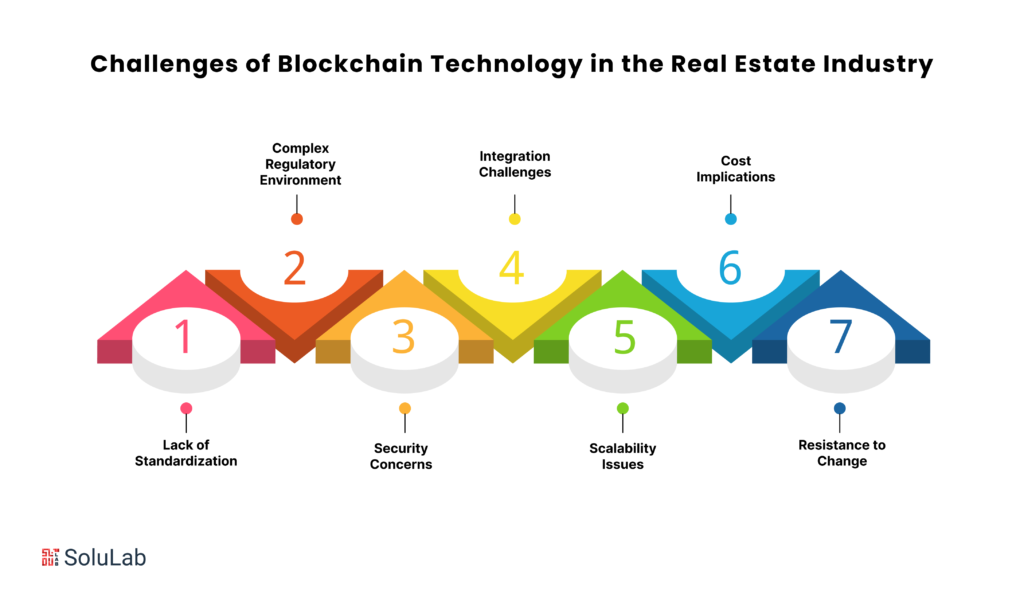Blockchain In Real Estate: How it is Transforming the Industry
The advent of blockchain technology is heralding a new era in various industries, and real estate is no exception. Traditionally, real estate transactions have been fraught with inefficiencies, from paperwork delays to fraudulent activities. However, blockchain’s decentralized, transparent, and secure framework offers the potential to resolve these issues, transforming how real estate transactions are conducted worldwide. For entities seeking innovation, such as a software development company, the intersection of blockchain and real estate represents a frontier ripe with opportunity and potential disruption.
Understanding Blockchain in Real Estate
At its core, blockchain is a decentralized ledger system that records transactions across multiple computers in such a way that the registered transactions cannot be altered retroactively. This characteristic makes blockchain a trustworthy platform for recording transactions, which is particularly valuable in the real estate industry, where trust and transparency are paramount.
Blockchain’s relevance to real estate stems from its ability to provide a secure, immutable record of ownership, contracts, and transactions. This feature alone can revolutionize property transactions, which have traditionally been paper-heavy and prone to fraud.
Key Benefits of Blockchain in Real Estate
Image source: PixelPlex
1. Enhancing Transparency and Reducing Fraud
One of the most significant benefits of blockchain in real estate is its potential to enhance transparency. Every transaction recorded on a blockchain is visible to all parties involved, reducing the likelihood of fraud. This transparency is crucial in an industry where property fraud can lead to substantial financial losses. For example, in the U.S. alone, property fraud costs homeowners and businesses millions of dollars annually.
Blockchain technology mitigates this risk by providing an immutable record of all transactions. Each transaction on the blockchain is timestamped and linked to previous transactions, making it nearly impossible to alter without detection. This feature is particularly beneficial in countries with high rates of property fraud. According to a study by the International Blockchain Real Estate Association (IBREA), implementing blockchain technology could reduce real estate fraud by as much as 50%, up to $160 billion annually.
2. Streamlining Property Transactions
Blockchain has the potential to significantly streamline property transactions, making them faster, more efficient, and less costly. Traditionally, real estate transactions involve multiple intermediaries, including brokers, lawyers, and banks, each adding time and costs to the process. Blockchain can eliminate many of these intermediaries by enabling peer-to-peer transactions through smart contracts.
Smart contracts are self-executing contracts with the terms of the agreement directly written into code. These contracts automatically execute and enforce the terms of an agreement when predetermined conditions are met, reducing the need for intermediaries. A software development company can develop custom smart contracts tailored to the specific needs of real estate transactions, ensuring a seamless and secure process.
For instance, Sweden’s Lantmäteriet, the country’s land registry authority, has been experimenting with blockchain to streamline property transactions. Their pilot project demonstrated that blockchain could reduce the time needed to complete real estate transactions from months to just days. This reduction in time not only benefits buyers and sellers but also makes the real estate market more liquid and dynamic.
Get in touch with Savvycom for a free consultation. We’ll help you decide on next steps, explain how the development process is organized, and provide you with a free project estimate.
3. Cost Reduction and Increased Efficiency
The cost-saving potential of blockchain in real estate is significant. By automating processes and eliminating intermediaries, blockchain can reduce transaction costs by a substantial margin. According to a report by Deloitte, blockchain could reduce the costs associated with real estate transactions by up to 30%. These savings are achieved primarily by cutting out the middlemen and automating tasks that were previously manual and time-consuming.
Furthermore, blockchain technology can increase the overall efficiency of the real estate market. With all transaction data stored on a decentralized ledger, property records can be accessed and verified quickly and easily, reducing the need for lengthy due diligence processes. This efficiency can be a game-changer in markets where property transactions are typically slow and cumbersome.
4. Facilitating Cross-Border Transactions
Another significant advantage of blockchain in real estate is its ability to facilitate cross-border transactions. Buying property in a foreign country has traditionally been a complex process involving multiple intermediaries, currency conversions, and legal considerations. Blockchain simplifies this process by providing a single, transparent platform where all transaction data is stored and accessible.
For example, Propy, a blockchain-based real estate platform, has successfully facilitated cross-border property transactions using cryptocurrency. In one notable case, Propy enabled the sale of an apartment in Ukraine to a buyer in the U.S., with the entire transaction recorded on the Ethereum blockchain. This transaction demonstrated blockchain’s potential to streamline and secure cross-border real estate deals, making it easier for investors to diversify their portfolios internationally.
5. Enabling Fractional Ownership and Crowdfunding
Blockchain is also opening up new opportunities for fractional ownership in real estate, making property investment more accessible to a broader audience. Through tokenization, real estate assets can be divided into smaller, tradable units, allowing investors to buy and sell shares in properties much like they would with stocks. This model democratizes real estate investment, enabling individuals to invest in high-value properties without needing to buy an entire property outright.
.png)
Image source: Landshare
Platforms like RealT and Harbor are already utilizing blockchain to offer fractional ownership opportunities. These platforms allow investors to purchase tokens representing shares in a property, which can then be traded on secondary markets. This not only benefits investors, who can now diversify their portfolios with real estate assets, but also property owners, who can access new sources of capital.
A software development company specializing in blockchain could develop similar platforms, tailored to specific markets or property types, ensuring that these systems are secure, scalable, and user-friendly. The potential for fractional ownership is particularly exciting in markets where property prices are high, and traditional ownership is out of reach for many individuals.
Have a Project Idea in Mind?
Get in touch with Savvycom’s experts for a free consultation. We’ll help you decide on next steps, explain how the development process is organized, and provide you with a free project estimate.
Challenges and Considerations in Blockchain Adoption
While the benefits of blockchain in real estate are clear, several challenges need to be addressed before the technology can be widely adopted. These challenges include legal, regulatory, and technical hurdles that must be overcome to ensure the successful implementation of blockchain in real estate.

Image source: SoluLab
1. Legal and Regulatory Challenges
One of the primary challenges in adopting blockchain for real estate transactions is the legal and regulatory environment. The legal status of blockchain transactions, particularly smart contracts, varies by jurisdiction. In some countries, the use of blockchain for real estate transactions is not yet fully recognized or regulated, which can create uncertainty and risk.
For example, while smart contracts can automate the execution of a real estate transaction, they may not be legally enforceable in all jurisdictions. Ensuring compliance with local laws and regulations is essential for the successful implementation of blockchain in real estate.
2. Technical Challenges and Standardization
Another challenge is the lack of standardization in blockchain protocols. Different blockchain platforms use different protocols, which can create compatibility issues and hinder the seamless integration of blockchain into existing systems. Moreover, the scalability of blockchain technology remains a concern, particularly in high-volume markets where thousands of transactions need to be processed simultaneously.
To address these challenges, the real estate industry will need to collaborate with technology providers to develop standardized blockchain protocols and scalable solutions. A software development company can play a crucial role in this process by developing custom blockchain solutions that are compatible with existing systems and can handle large volumes of transactions efficiently.
3. User Adoption and Education
Finally, user adoption is a critical factor in the successful implementation of blockchain in real estate. Many stakeholders in the real estate industry, including buyers, sellers, brokers, and regulators, may be unfamiliar with blockchain technology and hesitant to adopt it. Educating these stakeholders about the benefits and potential of blockchain is essential to drive adoption and ensure the technology’s success.
For example, real estate professionals will need to understand how to use blockchain platforms to conduct transactions, while regulators will need to be educated on how to oversee and enforce blockchain-based transactions.
Looking For a Trusted Tech Partner?
We’ll help you decide on next steps, explain how the development process is organized, and provide you with a free project estimate.
The Future of Blockchain in Real Estate
As blockchain technology continues to evolve, its impact on real estate is likely to grow. The adoption of blockchain could lead to a more transparent, efficient, and secure real estate market, benefiting both buyers and sellers. However, the future of blockchain in real estate will depend on the industry’s ability to overcome the challenges associated with its adoption.
Conclusion
Blockchain technology holds the promise of transforming the real estate industry by enhancing transparency, reducing fraud, streamlining transactions, and enabling new investment models. While challenges remain, the potential benefits of blockchain in real estate are too significant to ignore. As the industry continues to evolve, blockchain is set to play a pivotal role in shaping the future of real estate, offering new opportunities for innovation and growth. For those willing to embrace this change, the possibilities are endless.
At Savvycom, we understand the transformative power of blockchain technology and its potential to revolutionize industries worldwide. As one of the top blockchain app development companies, we specialize in blockchain development solutions that are tailored to meet the unique needs of our clients. Whether you’re curious about what is blockchain development or how blockchain works, we simplify these concepts, helping businesses integrate blockchain seamlessly into their operations. Our expertise spans across key sectors such as blockchain in banking, where we enhance security and transparency, blockchain in healthcare, driving efficiency and trust, blockchain in education, enabling secure credentials and certifications, and blockchain in telecommunication, streamlining data management. We also specialize in hybrid blockchain solutions, combining the benefits of both public and private blockchains to deliver versatile, scalable results. At Savvycom, we make blockchain a practical tool for innovation across industries.
Tech Consulting, End-to-End Product Development, Cloud & DevOps Service! Since 2009, Savvycom has been harnessing digital technologies for the benefit of businesses, mid and large enterprises, and startups across the variety of industries. We can help you to build high-quality software solutions and products as well as deliver a wide range of related professional services.
Savvycom is right where you need. Contact us now for further consultation:
- Phone: +84 24 3202 9222
- Hotline: +1 408 663 8600 (US); +612 8006 1349 (AUS); +84 32 675 2886 (VN)
- Email: [email protected]


